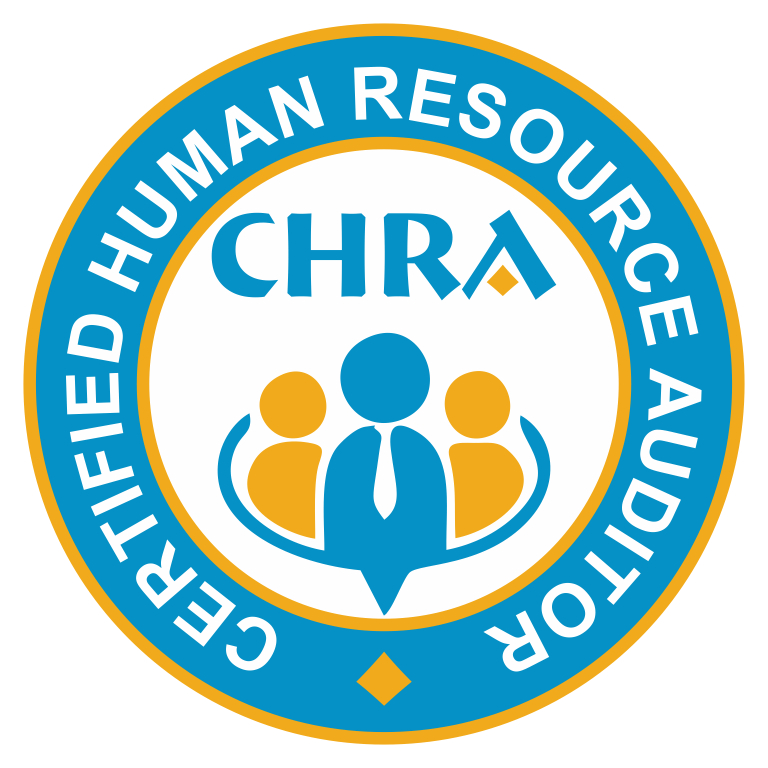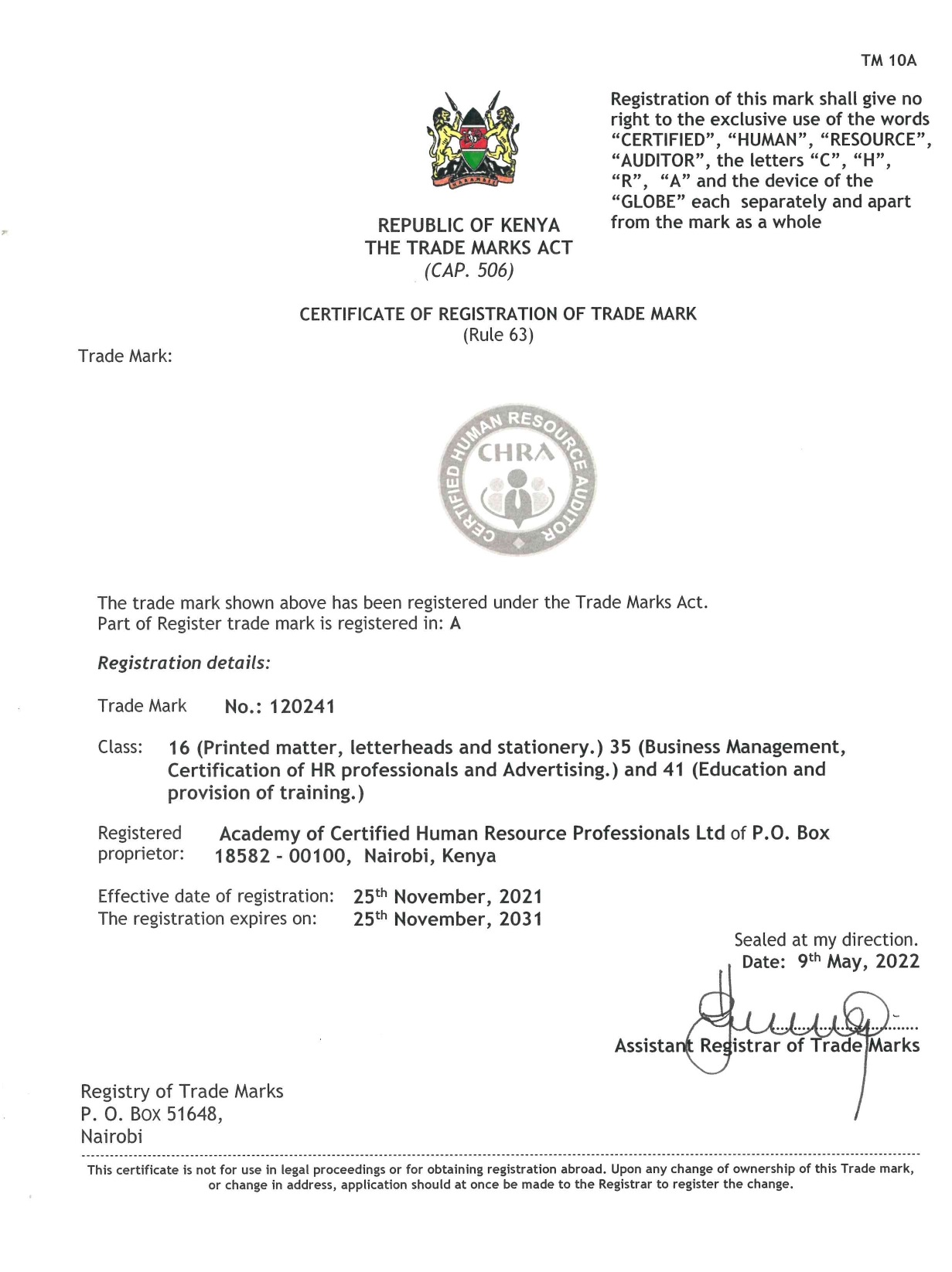| S/No. | Full Name | Institution | Issued On | Valid Until | Certification No. | Status |
|---|---|---|---|---|---|---|
| 1 | Wilfred Nyagudi | IHRM | 17:05:2024 | 17:05:2026 | CHRA433064 | |
| 2 | Lilian Ahona | IHRM | 17:05:2024 | 17:05:2026 | CHRA433066 | |
| 3 | Edna Jepkoech Koitie | IHRM | 17:05:2024 | 17:05:2026 | CHRA433039 | |
| 4 | Susan Naisiae Nkoiboni | IHRM | 17:05:2024 | 17:05:2026 | CHRA433041 | |
| 5 | Hudda Ahmed Abass | IHRM | 17:05:2024 | 17:05:2026 | CHRA433043 | |
| 6 | Hussein Mohamud | IHRM | 17:05:2024 | 17:05:2026 | CHRA433045 | |
| 7 | Odhiambo Emilly Akinyi | IHRM | 17:05:2024 | 17:05:2026 | CHRA433047 | |
| 8 | Fredrick K. Karani | IHRM | 17:05:2024 | 17:05:2026 | CHRA433049 | |
| 9 | Catherine Jelagat Kibet | IHRM | 17:05:2024 | 17:05:2026 | CHRA433051 | |
| 10 | Simeon Mumbu Kasina | IHRM | 17:05:2024 | 17:05:2026 | CHRA433053 | |
| 11 | Wilberforce Asava Kadima | IHRM | 17:05:2024 | 17:05:2026 | CHRA433055 | |
| 12 | Abudo Qonchoro Mamo | IHRM | 17:05:2024 | 17:05:2026 | CHRA433057 | |
| 13 | Tabitha Nyambura Norman | IHRM | 17:05:2024 | 17:05:2026 | CHRA433059 | |
| 14 | Joyce Naisiala Yiaile | IHRM | 17:05:2024 | 17:05:2026 | CHRA433061 | |
| 15 | Jacklyne Awuor Otuche | IHRM | 17:05:2024 | 17:05:2026 | CHRA433063 | |
| 16 | Mary Wanjiru Wainaina | IHRM | 17:05:2024 | 17:05:2026 | CHRA433065 | |
| 17 | Margaret Kanini Kitone | IHRM | 17:05:2024 | 17:05:2026 | CHRA433074 | |
| 18 | Alice Kamau | ACHRP | 10:05:2024 | 10:05:2026 | CHRA433014 | |
| 19 | Mary Salome Nang'oni | ACHRP | 01:01:2024 | 01:01:2026 | CHRA432943 | |
| 20 | Fridah Mbaya Gatabi | ACHRP | 01:01:2024 | 01:01:2026 | CHRA432945 | |
| 21 | Omar Saleh Silim | ACHRP | 01:01:2024 | 01:01:2026 | CHRA432948 | |
| 22 | Bernard Atonga | ACHRP | 01:01:2024 | 01:01:2026 | CHRA433004 | |
| 23 | Agmadige Abdikheir Mohamed | ACHRP | 01:01:2024 | 01:01:2027 | CHRA433038 | |
| 24 | Charles Kemboi Cherogony | ACHRP | 01:01:2024 | 01:01:2026 | CHRA433099 | |
| 25 | Salah Abdirahman Farah | ACHRP | 01:01:2024 | 01:01:2026 | CHRA433182 | |
| 26 | Aaditi Rajput | ACHRP | 01:01:2024 | 01:01:2027 | CHRA432944 | |
| 27 | Sarath Ravi Kumar | ACHRP | 01:01:2024 | 01:01:2027 | CHRA432947 | |
| 28 | Caroline Chepkoech Korir | ACHRP | 01:01:2024 | 01:01:2026 | CHRA432970 | |
| 29 | Fridah Nkatha Kiriiri | ACHRP | 01:01:2024 | 01:01:2026 | CHRA433084 | |
| 30 | Lydiah Njeri Kiromo | ACHRP | 01:01:2024 | 01:01:2027 | CHRA433170 | |
| 31 | Methuselah Langat Rono | ACHRP | 01:12:2023 | 01:12:2025 | CHRA432907 | |
| 32 | Nelly Anindo Kwashitungu | ACHRP | 17:11:2023 | 17:11:2025 | CHRA432802 | |
| 33 | Bernard Amadi | ACHRP | 17:11:2023 | 17:11:2025 | CHRA432832 | |
| 34 | Florence Mnyazi Arome | ACHRP | 17:11:2023 | 17:11:2025 | CHRA432843 | |
| 35 | Sophia Wambui Mwai | ACHRP | 17:11:2023 | 17:11:2025 | CHRA432852 | |
| 36 | Firdos Jafferali Kanji | ACHRP | 17:11:2023 | 17:11:2025 | CHRA432890 | |
| 37 | Stellah Naikara | ACHRP | 17:11:2023 | 17:11:2025 | CHRA432892 | |
| 38 | Gladys Njeri Muturi | ACHRP | 17:11:2023 | 17:11:2025 | CHRA432466 | |
| 39 | Mercy Mumbi Njeru Mwirigi | ACHRP | 17:11:2023 | 17:11:2025 | CHRA432474 | |
| 40 | Amoh Okodoi Lilian | ACHRP | 17:11:2023 | 17:11:2025 | CHRA432826 | |
| 41 | Lydia K. Mwatete | ACHRP | 17:11:2023 | 17:11:2025 | CHRA432831 | |
| 42 | Anestina Maithya | ACHRP | 17:11:2023 | 17:11:2025 | CHRA432833 | |
| 43 | Benjamin Shiholo Kubasu | ACHRP | 17:11:2023 | 17:11:2025 | CHRA432844 | |
| 44 | Mercy Temko | ACHRP | 17:11:2023 | 17:11:2025 | CHRA432883 | |
| 45 | Dorine Jerop Kabutiei | ACHRP | 17:11:2023 | 17:11:2025 | CHRA432891 | |
| 46 | Benson Obiri | ACHRP | 22:09:2023 | 22:09:2025 | CHRA432776 | |
| 47 | Leah Muthoni Kibui | ACHRP | 22:09:2023 | 22:09:2025 | CHRA432778 | |
| 48 | Eric Okelo Wangaji | ACHRP | 22:09:2023 | 22:09:2025 | CHRA432780 | |
| 49 | Catherine Wambui Gathoni | ACHRP | 22:09:2023 | 22:09:2025 | CHRA432740 | |
| 50 | Charity Jelagat | ACHRP | 22:09:2023 | 22:09:2025 | CHRA432661 |
Date |
Duration |
CPD |
Cost |
Venue |
Action |
|---|

CERTIFICATION MARK |
This certification program qualifies participants as a Certified Human Resource Auditor (CHRA) ® upon successful completion. HR has a legal and a financial impact on the organization. Therefore, HR Professionals should ensure the integrity and accuracy of the data they use and the processes they follow in their departments. One way to ensure that this is actually happening is by auditing the HR processes & activities currently in place. This course is designed to help participants identify the critical areas in HR that must be audited through an in depth step - by - step process and systematic series of questions about key compliance, risk management, internal audit, and HR Management issues. HR audits should additionally provide suggestions for corrective action. This program answers the question: Is the HR Function Fit to Purpose? |

CERTIFICATION CERTIFICATE |

CERTIFICATION MARK |
The objective of the Certified Human Resource Auditor training is to;
|

CERTIFICATION CERTIFICATE |

CERTIFICATION MARK |
• Need and Objectives of HR Audit • Scope of HR Audit • Limitations of HR Audit • HR Auditor Requirements • HR Strategies • HR Competencies • HR Culture • HR Values • HR Impact • Interviews • Group Discussion and Workshops • Observation • Analysis of Records and Documents • Questionnaires • Competency Mapping • Manpower Planning • Recruitment • Induction and Integration • Performance Management • Potential Appraisal and Assessment Centers • Career Planning and Development • Job Rotation • Training and Learning • Organization Development • Auditing Communication Strategy • Auditing of Employee Engagement • Auditing of Quality Orientation • Auditing of Customer Orientation • Auditing of Entrepreneurial Spirit • Auditing of Culture Building • Auditing Talent Management • Auditing Competencies of the HRD Staff • Auditing Learning Attitude of Line Managers • Auditing Top Management Styles • Auditing Learning Orientation of Non-Supervisory Staff • Auditing Credibility of the HR Department • Collaboration and Team Work • Trust and Trustworthiness • Authenticity • Proactivity and Initiative • Autonomy • Confrontation • Experimentation • Organizational Culture • Talent Management • Intellectual Capital • Financial Measures |

CERTIFICATION CERTIFICATE |

CERTIFICATION MARK |
1. As a mark of recognition a successful candidate is entitled to use the designatory title "CHRA®” after their names. 2. A successful candidate will also be able to call him or herself a Certified Human Resource Auditor. |

CERTIFICATION CERTIFICATE |

CERTIFICATION MARK |
1. Be a HR Professional, ISO Auditors and or an Internal Audit professionals in the HR function. 2. Successfully complete the certification course with an Authorized Educational Institution; and 3. Be a member of the Institute of Human Resource Management in order to fulfill the candidate’s ongoing professional development obligations after certification. |

CERTIFICATION CERTIFICATE |





